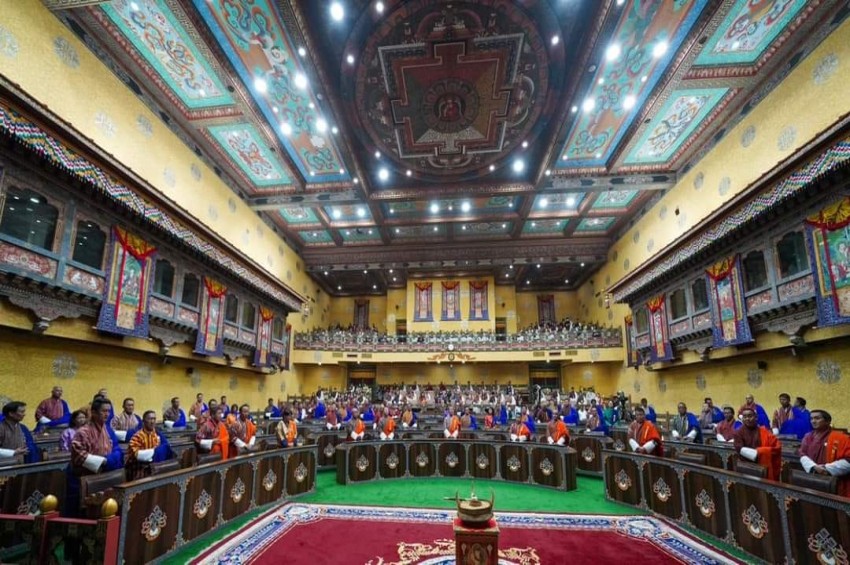The Royal Civil Service Commission’s (RCSC) exercise for a fundamental shift in the RCSC’s approach towards leadership selection and performance management has not ended after 44 executives were managed out. Instead, the commission is working closely with executives to accelerate efforts to transform the Civil Service. The exercises are currently underway and according to an officer from the RCSC, it is expected to have it ready for implementation by the next fiscal year.
Meanwhile, people who have been following the reforms say it is the right time and an opportunity for the RCSC to solve several issues, such as political appointees. Others say that the RCSC should be cautious and ensure that power blocs are not formed in the process of merging agencies and that executives involved in the reforms should not permit some from “hijacking” the process.
The RCSC had said efforts made “will result in a fundamental shift and overhaul of the manner in which public service are delivered to the people, and how Civil Service agencies are organized to do so. An officer from the RCSC said the commission will redesign public service delivery and reorganize agencies “such that the well-being of our citizens and our future generations are front and center.” He added that the Civil Service will strive harder to deliver economic prosperity, progress and wellbeing for all.
In an earlier press release the RCSC had also said “Agencies may be merged, positions made redundant, and others streamlined.” An officer from the Commission had said that Organizational Development (OD) in the past were done, but primarily within the agencies. This has changed and executives at the national level are collectively working to ensure coordination.
However, there are some who say RCSC should be cautious. “In the process of merging etc, civil servants should not be overworked, as this will make them less efficient. Moreover, they will become powerful and all said and done, power can be abused, leading to corruption,” Jigme Tshering, a self –employed businessman said. “I am definite that the executives and RCSC are taking account of all this and one of the most dangerous outcomes could be giving elected leaders more power, which should be avoided at all costs,” he said, citing a comment made by an officer from the RCSC in one of Bhutan’s weekly papers that when concerning the number of ministries, it would have to be a political decision and recommendations would be made to the government. “The reforms provide the best opportunity to discuss issues such as political appointees and politicization of the bureaucracy. As we have seen, political appointees always emerge as an issue. The RCSC and the government should take advantage of the reform to solve all these issues,” he said.
Jigme also added that the RCSC reforms should not be based on the “Bhutan of Today.” “Technology is changing everything and so executives and the RCSC should make the civil service something that will remain relevant even after two to three decades. It is good to hear that coordination is there as a reform of this size needs to consider the country’s demographic dividend, education or curricula and several important aspects,” he said, adding that poor coordination between Bhutan’s education and market needs is the main factor behind unemployment.
Similarly, commenting on merging, redundancy and streamlining, a civil servant who retired when he was director, said it is very rational. “In the past we needed more people due to constrains arising from poor infrastructure like roads. Additionally, technology was non-existent and there weren’t many qualified people at the leadership level, too, due to which junior officers had to be assigned to help the leaders.” “Like His Majesty always says, we have to move with time and at this juncture, I feel there are several positions, which are just duplications; like director generals (DGs) and directors. Do ministries really need DGs when Secretaries are there and are DGs required when Directors are there,” he said.
A civil servant, seeking anonymity said, the RCSC needs to study if departments and divisions are required, too. “Merging and doing away with some will not only have economic benefits but also enhance accountability and reduce bureaucratic red-tape,” he said, adding these are very similar to the Department of Local Governance’s (DLG) proposals to reduce the number of gewogs.
According to him, the RCSC should focus on “big” ministries, like the Ministry of Agriculture and Forests (MoAF) and positions, such as “Drungpas” and “Dzongrabs.” “Do we really need these posts now? In some areas, it may be relevant but not in areas like Wamrong, which is just a three hour journey to Trashigang.”
Meanwhile, a teacher, who did not want to be named expressed her apprehensions of “one or few individuals hijacking the entire process.” “While the RCSC is saying that executives are involved, I am very wary about some executives who always dominate discussions, and somehow manage to push his or her agenda through. If this happens, then work done will be zero. As executives, involved in this very important exercise, they should be aware of His Majesty’s vision of the country and collectively work towards achieving that,” she said. When asked what she actually meant, she said there would definitely be executives, who are more experienced, renowned, but “stubborn.” “This kind of people always think they are right and will never accept the views of others. Though, the executives know that the exercise is important and coordination required, we should not forget that these executives would be dealing with the kind of people mentioned above and their voices will be buried,” she said.
Meanwhile, there are apprehensions, especially in the ESP categories, that the reform may lead to them losing their jobs. “We understand the reforms are for the good of the country. Several Dashos (executives) lost their jobs after assessment. Due to technological developments, we may also be asked to leave the civil service any time. However, there are several important projects like the Gyalsung Project, where we may be able to do something,” one civil servant from the ESP category said. “The executives who left and we are entirely different. We have nothing and if the RCSC could take into account such facts, it would be very helpful to people like me and others,” he said.
Meanwhile, people who have been following the reforms say it is the right time and an opportunity for the RCSC to solve several issues, such as political appointees. Others say that the RCSC should be cautious and ensure that power blocs are not formed in the process of merging agencies and that executives involved in the reforms should not permit some from “hijacking” the process.
The RCSC had said efforts made “will result in a fundamental shift and overhaul of the manner in which public service are delivered to the people, and how Civil Service agencies are organized to do so. An officer from the RCSC said the commission will redesign public service delivery and reorganize agencies “such that the well-being of our citizens and our future generations are front and center.” He added that the Civil Service will strive harder to deliver economic prosperity, progress and wellbeing for all.
In an earlier press release the RCSC had also said “Agencies may be merged, positions made redundant, and others streamlined.” An officer from the Commission had said that Organizational Development (OD) in the past were done, but primarily within the agencies. This has changed and executives at the national level are collectively working to ensure coordination.
However, there are some who say RCSC should be cautious. “In the process of merging etc, civil servants should not be overworked, as this will make them less efficient. Moreover, they will become powerful and all said and done, power can be abused, leading to corruption,” Jigme Tshering, a self –employed businessman said. “I am definite that the executives and RCSC are taking account of all this and one of the most dangerous outcomes could be giving elected leaders more power, which should be avoided at all costs,” he said, citing a comment made by an officer from the RCSC in one of Bhutan’s weekly papers that when concerning the number of ministries, it would have to be a political decision and recommendations would be made to the government. “The reforms provide the best opportunity to discuss issues such as political appointees and politicization of the bureaucracy. As we have seen, political appointees always emerge as an issue. The RCSC and the government should take advantage of the reform to solve all these issues,” he said.
Jigme also added that the RCSC reforms should not be based on the “Bhutan of Today.” “Technology is changing everything and so executives and the RCSC should make the civil service something that will remain relevant even after two to three decades. It is good to hear that coordination is there as a reform of this size needs to consider the country’s demographic dividend, education or curricula and several important aspects,” he said, adding that poor coordination between Bhutan’s education and market needs is the main factor behind unemployment.
Similarly, commenting on merging, redundancy and streamlining, a civil servant who retired when he was director, said it is very rational. “In the past we needed more people due to constrains arising from poor infrastructure like roads. Additionally, technology was non-existent and there weren’t many qualified people at the leadership level, too, due to which junior officers had to be assigned to help the leaders.” “Like His Majesty always says, we have to move with time and at this juncture, I feel there are several positions, which are just duplications; like director generals (DGs) and directors. Do ministries really need DGs when Secretaries are there and are DGs required when Directors are there,” he said.
A civil servant, seeking anonymity said, the RCSC needs to study if departments and divisions are required, too. “Merging and doing away with some will not only have economic benefits but also enhance accountability and reduce bureaucratic red-tape,” he said, adding these are very similar to the Department of Local Governance’s (DLG) proposals to reduce the number of gewogs.
According to him, the RCSC should focus on “big” ministries, like the Ministry of Agriculture and Forests (MoAF) and positions, such as “Drungpas” and “Dzongrabs.” “Do we really need these posts now? In some areas, it may be relevant but not in areas like Wamrong, which is just a three hour journey to Trashigang.”
Meanwhile, a teacher, who did not want to be named expressed her apprehensions of “one or few individuals hijacking the entire process.” “While the RCSC is saying that executives are involved, I am very wary about some executives who always dominate discussions, and somehow manage to push his or her agenda through. If this happens, then work done will be zero. As executives, involved in this very important exercise, they should be aware of His Majesty’s vision of the country and collectively work towards achieving that,” she said. When asked what she actually meant, she said there would definitely be executives, who are more experienced, renowned, but “stubborn.” “This kind of people always think they are right and will never accept the views of others. Though, the executives know that the exercise is important and coordination required, we should not forget that these executives would be dealing with the kind of people mentioned above and their voices will be buried,” she said.
Meanwhile, there are apprehensions, especially in the ESP categories, that the reform may lead to them losing their jobs. “We understand the reforms are for the good of the country. Several Dashos (executives) lost their jobs after assessment. Due to technological developments, we may also be asked to leave the civil service any time. However, there are several important projects like the Gyalsung Project, where we may be able to do something,” one civil servant from the ESP category said. “The executives who left and we are entirely different. We have nothing and if the RCSC could take into account such facts, it would be very helpful to people like me and others,” he said.

















